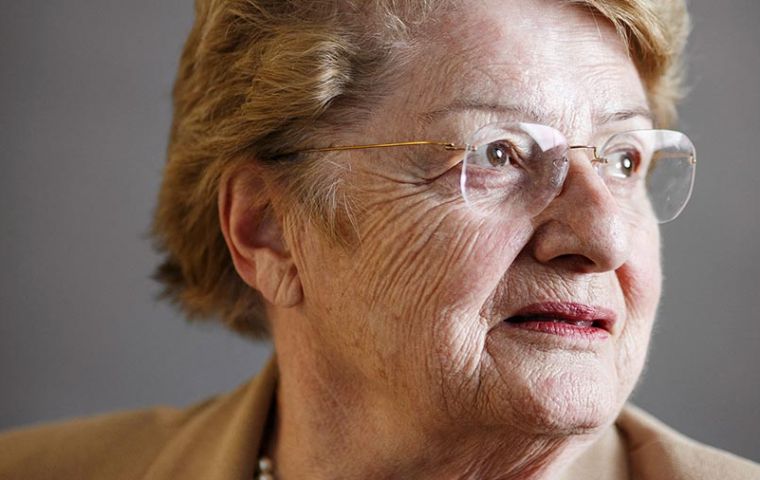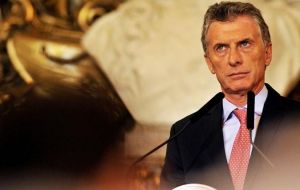MercoPress. South Atlantic News Agency
Argentina Needs Intensive Care
 A. Krueger was First Deputy Managing Director of the IMF from 2001 to 2006. From 1982 to 1986, she was Vice President, Economics and Research at the World Bank
A. Krueger was First Deputy Managing Director of the IMF from 2001 to 2006. From 1982 to 1986, she was Vice President, Economics and Research at the World Bank  When Mauricio Macri, succeeded the Peronists in 2015, he inherited an absolute mess
When Mauricio Macri, succeeded the Peronists in 2015, he inherited an absolute mess  While high and rising real interest rates were attracting capital inflows to finance the government and current-account deficits, inflation was high and the growth rate was low.
While high and rising real interest rates were attracting capital inflows to finance the government and current-account deficits, inflation was high and the growth rate was low. By Anne Krueger (*) - Argentina's President Mauricio Macri knew that he had inherited a sick economy when he took office in 2015, but failed to take his medicine. As a result, the country now has no choice but to face up to a period of painful structural adjustment.
Imagine a man who has lived too extravagantly and eventually must go to the doctor for treatment of an acute disease, along with several other chronic conditions. The doctor prescribes a ten-day course of antibiotics, and advises his patient to start taking better care of himself. After three days of taking the pills and following the doctor’s orders, the man feels much better. But he finds the quiet life painful, so he forgets the medicine and his doctor’s advice and doubles down on debauchery.
For a while, his return to the high life feels great. But, before long, he is back at the doctor, in even worse shape than before. The cycle repeats itself: he takes his medicine for a full week this time, but eventually reverts to his old habits.
Argentina is that man, chronically overspending and over-regulating until it s forced to go to the International Monetary Fund for a new round of treatment. In 2001, the country suffered a major crisis, and had to borrow from abroad to meet government expenditures. With a current-account deficit over 5% of GDP and its currency pegged to the US dollar, its structural policies proved unsustainable. It needed IMF support just to cover its current expenses, and had no resources left for debt service.
Abandoning the dollar peg, Argentina adopted necessarily restrictive monetary and fiscal policies, and entered into an IMF loan program. But its debt restructuring was messy, and policies to address its underlying structural problems – lowering trade barriers, allowing public-utility prices to rise – were pursued halfheartedly or not at all.
After several years of relatively restrictive economic policies, growth picked up only slightly, and government spending and fiscal deficits began to increase once again. Consolidated public expenditures rose from a low of 22.9% of GDP in 2002 to 30.1% of GDP in 2008, and to 4.2% in 2015. Until 2010, high commodity prices had enabled a boom, but the Peronist governments of Presidents Néstor Kirchner and his wife and successor, Cristina Fernández de Kirchner, had imposed price controls and prevented state agencies from reporting accurate inflation figures.
When the commodity boom ended, government expenditures and the fiscal deficit increased, and Argentina’s problems returned. Capital controls were again imposed to stem capital flight, and the peso’s exchange rate against the US dollar depreciated from 3.90 at the end of 2010 to 8.50 by the end of 2014. Utility prices were held at loss-making levels; structural problems abounded.
For an economy as distorted as Argentina’s, there is no medicine that can prevent a period of painful adjustment. When Argentina’s current president, Mauricio Macri, succeeded the Peronists in 2015, he inherited an absolute mess. While high and rising real interest rates were attracting capital inflows to finance the government and current-account deficits, inflation was high and the growth rate was low.
Macri had promised reforms, including removal of capital controls, a floating exchange rate, fiscal retrenchment, and more realistic utility prices. The first two reforms were carried out shortly after he took office, but other measures were delayed or slowed to maintain public support. As a result, the fiscal deficit actually increased during Macri’s first year, and the other reforms proved insufficient to stabilize the economy. Although the inflation rate had dropped, it soon began to rise again.
By early 2018, Argentina was in another crisis. While public expenditures had fallen slightly, to 40.4% of GDP, the consolidated fiscal deficit was 4.2% of GDP. Moreover, government dollar-denominated debt had risen by 80%, private capital inflows had turned into outflows, a drought had reduced output, the inflation rate had shot up to over 40%, and real GDP had fallen by 2.5%. In response to all this, the central bank abandoned its inflation-targeting framework, further weakening confidence in the government’s policies.
Before long, Argentina was forced to crawl back to the doctor. Owing to the reforms that had already been undertaken, in June 2018 the IMF approved a US$ 50 billion loan program, the largest in the Fund’s history. Over the next year, it looked as though the IMF program and the Macri government’s policies might yet turn things around, reducing inflation and restarting growth. But then Macri suffered a symbolic defeat in the country’s primary elections last month, which strongly suggests that he will be ousted by Peronists in next month’s presidential election. All too predictably, capital outflows became a deluge, the peso depreciated sharply, inflation rose, and the government was forced to reinstate capital controls.
The problem, once again, is that the medicine was not strong enough. At the patient’s insistence, the measures were too mild to be effective, and more difficult structural reforms were delayed. Obviously, macroeconomic stabilization is essential. But the only possible way to prevent a deepening of the crisis before the October vote is for the candidates to commit to serious reforms after the election. That is what Lula da Silva did in Brazil’s 2002 presidential election, and it worked. He honored his reform commitment once in office, and Brazil not only avoided a crisis but experienced several years of strong growth.
Argentina’s crisis calls for a continuation of the fiscal, monetary, and exchange-rate measures outlined in the IMF program. Beyond that, the country needs structural reforms, especially a further reduction in the size of the government sector, starting with pensions. More gradualism will only prolong the pain and allow political opposition to mount. If the patient takes the medication but continues to party, he may enjoy a few years of stability, but inevitably will end up back in the doctor’s office. So, first things first: the presidential candidates must commit to serious reforms, or the doctor may decide to pull the plug. (PS)./
(*) Anne O. Krueger is a Senior Fellow at the Stanford Center for International Development (of which she was the founding Director) and the Herald L. and Caroline Ritch Emeritus Professor of Sciences and Humanities in the Economics Department at Stanford University. Currently, she is a professor at the John Hopkins University, School for Advanced International Studies.
Anne Krueger was First Deputy Managing Director of the International Monetary Fund from 2001 to 2006. Prior to that, she had taught at Stanford and Duke Universities. From 1982 to 1986, she was Vice President, Economics and Research at the World Bank. She had earlier been Professor of Economics at the University of Minnesota.
Professor Krueger has held visiting Professorships at a number of universities, including the Massachusetts Institute of Technology, Northwestern University, Bogazici University (Istanbul), the Indian Council for Research on International Economic Relations (ICRIER), Monash University and the Australian National University, and the Stockholm Institute for International Economics. She holds a B.A. from Oberlin College and a Ph.D. from the University of Wisconsin.
Professor Krueger is a Distinguished Fellow and past President of the American Economic Association, a Senior Research Fellow of the National Bureau of Economic Research, and a member of the National Academy of Sciences, the American Academy of Arts and Sciences, the Econometric Society, and the American Philosophical Society.
She has published extensively on economic development, international trade and finance, and economic policy reform. In addition to her writings on these topics, she has written a number of books and articles on economic growth, international trade, and economic policy in India, South Korea, and Turkey.




Top Comments
Disclaimer & comment rules-

-

-

Read all commentsWhere are Tinkle and et al to convince us that this lady is talking rubbish.
Sep 25th, 2019 - 09:25 am +1REF: “When Mauricio Macri, succeeded the Peronists in 2015, he inherited an absolute mess”:
Sep 26th, 2019 - 08:52 pm 0Funny, he is yearning to inherit a yet bigger mess AGAIN!
Anne Krueger was in charge of the IMF when it denied a loan to Argentina, which was one of the factors leading to the catastrophic default of 2001.
Oct 01st, 2019 - 05:25 pm 0She emerges from wherever she nestles to parrot the same theories the IMF has held for decades that have mercilessly deepened recession in many already heavily indebted countries.
“For an economy as distorted as Argentina’s, there is no medicine that can prevent a period of painful adjustment,” she wrote in the above article.
Well, madame. Portugal, for example, was successful when it followed a different path. Alberto Fernandez has been overwhelmingly been endorsed by the Argentine electors on a totally opposed direction to that recommended by the IMF's. His goal is to put the country on a path of growth while implementing a more equitable distribution of the national revenue in favour of the workers and the poor.
It will be interesting to see, after the Oct. 27 presidential election, whether Alberto and Cristina are able to go past obstacles and implement their platform, and whether they succeed reversing the current downward trend.
Commenting for this story is now closed.
If you have a Facebook account, become a fan and comment on our Facebook Page!